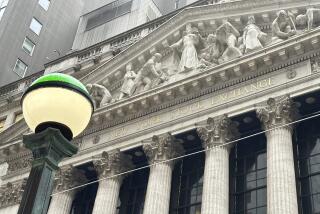Evidence Points to Fed Hike, Bond Guru Says
- Share via
William Gross, manager of the world’s largest bond fund, says the continuing surge in the stock market makes it more likely Federal Reserve policymakers will raise short-term interest rates when they meet on Tuesday.
“If stocks keep doing what they’ve been doing, it seems obvious to me that the [Fed’s key rate] will be increased” as early as this week, said Gross, who oversees about $180 billion of bonds at Pacific Investment Management Co. in Newport Beach.
“We have the makings of a bubble, if a bubble doesn’t already exist” in U.S. stocks, Gross said at a Society of American Business Editors and Writers personal finance conference in Las Vegas last week.
Gross’ view on the Fed’s course of action isn’t necessarily in the majority. Indeed, long-term bond yields fell to seven-week lows last week as fresh economic data suggested the economy is showing signs of slowing, while productivity growth remains strong.
On Friday, the government said the growth in American workers’ productivity--the amount of output for each hour of work--rose at a 4.2% annual rate in the July-September quarter.
Unit labor costs, considered a key measure of wage pressure, rose just 0.6%, the slowest quarterly increase this year.
Those factors, many economists believe, will keep the Fed on hold, at least for now, after raising interest rates a total of a half-percentage point in two moves last summer.
“These reports line up on the side of the Fed keeping rates unchanged for a while longer,” said economist Ken Mayland of Cleveland-based Key Bank.
But Gross argues that while it may seem counterintuitive, a decision by the Fed not to raise the federal funds rate--the overnight loan rate among banks--from its present 5.25% “wouldn’t be good for bonds.”
Leaving interest rates unchanged would cause many investors, including himself, to question Fed Chairman Alan Greenspan’s “vigilance in preventing the bubble from expanding” and potentially overheating the U.S. economy and fueling inflation, he said.
Gross said he expects the yield on the benchmark 30-year Treasury bond, which closed at 6.03% on Friday, down from 6.06% a week earlier and a recent peak of 6.38% on Oct. 26, to range between 4.5% and 6.5% “for the foreseeable future” as long as inflation stays below 3%.
“Bonds these days are dominated by stocks,” Gross said. “Greenspan is almost phobic about the stock market, with some justification.” Still, the Fed chairman faces a dilemma in trying to deflate the asset bubble, he said.
By cutting interest rates three times last year--after markets around the world seized up in the wake of Russia’s debt default--Greenspan sent a message that the Fed would step in when stocks plunge, Gross said.
Stock fund managers have taken that as an insurance policy to keep bidding stocks higher, he said.
At the same time, that increases the odds there eventually will be a big drop in U.S. Internet-related and other tech shares that “throws a monkey wrench” into the U.S. and global economies, Gross said.
Greenspan described his current interest in stocks at an annual conference of central bankers and economists in Jackson Hole, Wyo. in August, though he didn’t say he saw a bubble in stock prices.
“There are important--but extremely difficult--questions surrounding the behavior of asset prices and the implications of this behavior for the decisions of households and businesses,” Greenspan said.
He did talk about how difficult it is for central bankers to know how to react to asset price changes. “Central bankers don’t respond to gradually rising asset prices,” Greenspan said. “We do respond to quickly declining asset prices.”
Gross, who oversees all of Pimco’s bond operations, also said Pimco’s funds have been reducing their holdings of junk bonds and others with high yields because of concerns about rising default rates and the economy’s next turn.
More to Read
Inside the business of entertainment
The Wide Shot brings you news, analysis and insights on everything from streaming wars to production — and what it all means for the future.
You may occasionally receive promotional content from the Los Angeles Times.










